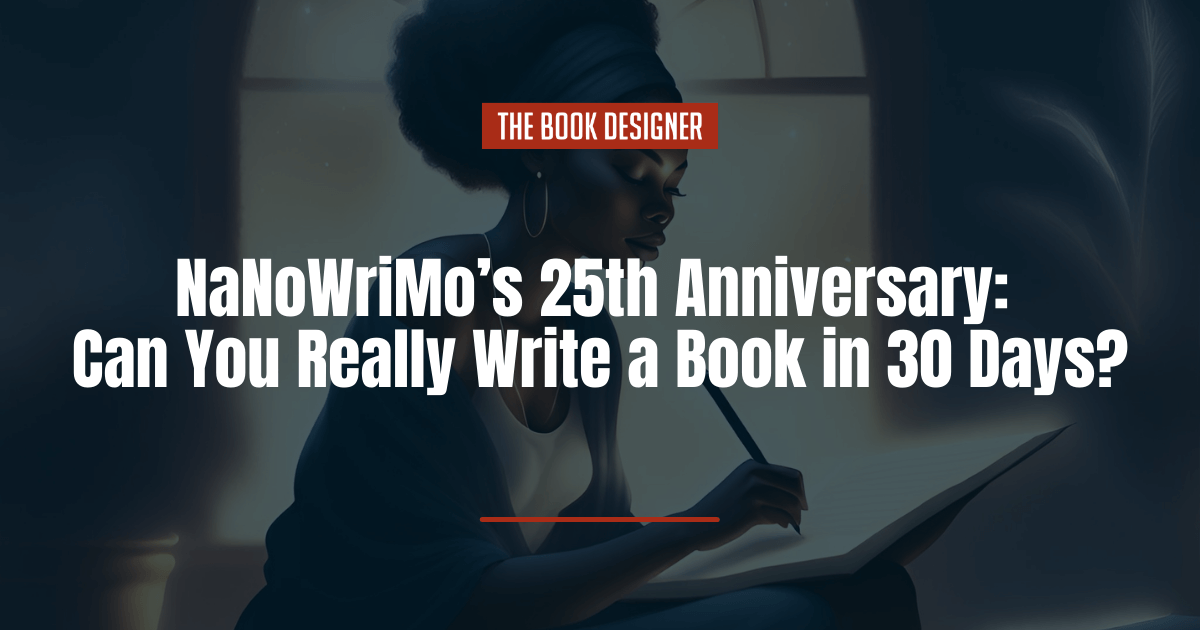We’re approaching the 25th annual NaNoWriMo, as National Novel Writing Month is affectionately called, and every year a new crop of authors ask if it’s really possible to write an entire novel in just one month.
The short answer is, yes. I’ve done it myself multiple times. But that’s not the full answer.
While you can certainly write a rough (and in some cases very rough) draft in 30 days, the chances that you’ll write something that’s publishable without a lot of editing is slim. That said, the restrictions and structure that NaNoWriMo provides can be an excellent way to get your creative juices flowing and turn out work with great potential.
Here’s what you need to know about participating in NaNoWriMo:
So What is NaNoWriMo?
National Novel Writing Month started back in 1999, making 2023 the 25th annual NaNoWriMo (they’re even using the hashtag #NaNoWriMo25 this year). The basic rules are simple:
- Write 50,000 words in 30 days, starting at midnight on November 1st and ending at 11:59pm on November 30th.
That’s it. That’s the only real rule.
Over the last 25 years, quite a community has been built around NaNoWriMo, with official forums, in-person and virtual events, and more. Personally, I’ve participated for at least eight years out of the last 25, and have “won” three or four times. “Winning,” of course, is simple: write 50,000 words and get them verified through the online verification system.
Benefits of Participating in NaNoWriMo
There are three main benefits to participating in National Novel Writing Month.
The first is that, assuming you take it seriously and stick to your daily goal count, you’ll end up with at least 50,000 words written at the end of the month. And many writers end up with way more than that. I’ve heard of writers who completed over 120,000 words in a single month, and I personally did over 90,000 words one year.
The second benefit to participating in NaNoWriMo is that you build a steady writing habit. Forming a new habit takes approximately 30 days. So if you spend the entire month writing every day, you will likely develop a daily writing habit. And if you ask almost any successful author what their secret to success is, they’ll tell you that it’s consistency in their writing habits.
The third benefit is the community that surrounds National Novel Writing Month. There are online forums where people often converse, either about their novels or in off-topic boards about a variety of topics. There are genre-specific boards and boards for various age groups, too.
Beyond the official forums, though, there are in-person events (usually write-ins) hosted around the country and world. These can be a great way to meet and network with other writers in your community. There are virtual events, too, if no in-person events are taking place in your region.
How to Participate in NaNoWriMo
The first thing you need to do to participate in NaNoWriMo is to sign up for a free account on the NaNoWriMo website. From there, you can set up your writer profile, including a profile picture, bio, and any information you want to include about your project.
You’ll also set your writing goal for the month. The most common goal is the minimum: 50,000 words. But some authors reach for higher goals during the month.
On November 1st, you’ll start writing! There are writers who stay up past midnight the night before in order to get a head start on their writing, while others start first thing in the morning. Which one you choose is entirely up to you and your schedule. Some years, November 1st falls on a weekend, which can make getting a head start easier. This year, though, November 1st is a Wednesday, so it’s likely a work day for most people.
To meet the 50,000 word goal, you’ll need to write an average of at least 1,667 words each day. You can copy and paste your work into the official verifier each day to make sure that you’re staying on track and it will show your progress (or you can enter your word count manually each day).
One thing to note: the official word count verifier does not necessarily show the same word count as every word processor out there, so it’s a good idea to figure out how much variation there is between your writing app of choice’s word count and the official one to prevent any nasty surprises when you submit for verification at the end of the month. I’ve seen too many people sure that they had won come up a few hundred words short in the official word counter when it was too late to fix it.
During the month, drop by the forums to see what others are up to, get some motivation, or help motivate others. Be aware that the forums can be addictive, so you may want to get your daily word count done first and treat the forums like a reward!
NaNoWriMo Tips for Success
There are a lot of things you can do to improve your chances of success going into National Novel Writing Month. One of the main things, though, is to properly prepare. Keeping a constant pace of almost 1700 words every day for 30 days is easier if you go into November with the proper preparation.
While some NaNoWriMo participants prefer to “pants” their writing and go into the month without an outline, a lot of successful writers spend more time on the preparation phase during the month of October.
Spending some time outlining your novel (an easy way to do this is to follow the hero’s journey structure) will make it less likely that you’ll get stuck 20,000 words in. There’s nothing worse than being a significant way into your novel only to get writer’s block.
Even if you don’t outline, spend some time getting to know your characters and setting, especially if your setting isn’t the contemporary world. You can create files with information on each of your characters and each major part of your setting so that all the info you need is at your fingertips once you start writing. And if your novel will take place over an extended time period, consider creating a timeline to keep the order of events straight.
Here are some other tips for success:
- Don’t worry about perfection. Most of the real writing takes place in the editing stage. Consider your NaNoWriMo draft to be a “vomit” draft—just get all the ideas on the page and worry about making it sound pretty later. Remember: you can’t edit a blank page. And you’re crunched for time.
- Just keep writing, even if you feel like you’ve written yourself into a hole. If you have to, throw in something off-the-wall or unconventional to move the story along, even if it doesn’t fit in the world of your novel. You can fix it in the editing process. And who knows? Maybe it’ll spark some brilliant ideas in the process.
- Take breaks when you need them. If you’re having a particularly good writing day, feel free to write 2,000, 3,000, or even 5,000 words over your daily goal. That way, if you have a slow writing day (or a busy day otherwise) and can only write a couple hundred words, you don’t have to stress about being behind. And if you need a day off, take one!
- Write every day. Even if you only write ten words, write something. This helps you keep up your momentum and build the daily writing habit.
- Find a writing buddy or support group. If you don’t know anyone in real life who’s participating in NaNoWriMo, find someone online. Check in with each other regularly to see how everything is progressing and help keep each other motivated to finish.
- DO NOT EDIT. Yes, that’s in all caps. Do not spend time editing your work during NaNoWriMo. It can be tempting to do so. Sometimes you get a great idea about how to change something in a prior scene or chapter and want to go back and fix it. Resist that urge. Instead, make note of what you want to fix (you can even do this write within your manuscript, which helps your word count) and go back to it later—after your draft is done.
- Sometimes you just have to be overly loquacious in your writing endeavors. Why use a single word when you can say the same thing with an entire sentence? After all, you’ll clean things up in the editing process. And it can be a fun exercise in creativity.
- One really fun thing you can do to keep yourself motivated is create a mockup of your book cover and share it on your project page on the NaNoWriMo website.
You Won! (Or Maybe You Didn’t…) Now What?
Congratulations, you just wrote 50,000 words in a single month! Or, great effort, you can always try again next year!
Either way, once November is over, what’s next?
If you’ve completed the entire rough draft, take a break! Binge watch Netflix. Listen to some audiobooks. Take a walk outside. Reconnect with the friends and loved ones you no doubt neglected during National Novel Writing Month.
If you didn’t complete the entire rough draft and you feel like it’s worth finishing (let’s be real, sometimes at the end of NaNoWriMo we have 50,000 words of hot garbage we never want to see again), create a production plan for finishing it. While you don’t have to keep up the 1667 word/day pace, figure out what kind of pace is comfortable for you and your life, whether that’s 500 words or 1,000 words or something else entirely.
Once your draft is finished, either during or after NaNoWriMo, you’ll want to set it aside for at least a couple of weeks. Personally, I like to set aside my drafts until I’ve forgotten a good part of the story. After that, start editing!
What About Nonfiction Authors?
If you’re a nonfiction author, there’s good news: NaNoWriMo can also stand for National Nonfiction Writing Month. NaNoWriMo is filled with rebels (there’s even an official forum for them) who are writing things other than novels, whether that’s nonfiction, poetry, short story collections, or something else entirely.
Here are a few tips for successfully completing NaNoWriMo with a nonfiction manuscript:
- Do you research before November begins! Nonfiction often includes more research than fiction (though not always) so if you need to find sources, do so in October and keep them organized.
- Don’t get bogged down in verifying and sourcing the correct facts in your manuscript as you write. You can simply insert a note for yourself to find the most accurate information during the editing phase and put in some filler information during the writing process. That doesn’t mean you should make things up entirely, but if you know you read a certain statistic and can’t remember where off the top of your head, don’t worry about searching for it in the moment. Just note it for later.
- Outline or mindmap the main points for your book before you start. Nonfiction often needs more structure than fiction, so having that structure defined before you start is really helpful.
The rest of the tips in this article apply to nonfiction just as much as fiction!
Some Final Thoughts on NaNoWriMo
NaNoWriMo is a great way to build a daily writing habit, to challenge yourself, and to achieve some big writing goals. Even if you don’t end up with a finished manuscript at the end of November, you’ll have grown by leaps and bounds as a writer.
Besides, NaNoWriMo has one of the most supportive writing communities out there, filled with writers of all levels. It’s a great way to get involved in the writing community and find some like-minded people.
For more information about NaNoWriMo and their impact in the writing world, check out their website.




